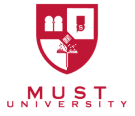Dual Master in Data Science & Artificial Intelligence
Langue
Durée
Cycle
Approche
Les étudiants doivent être titulaires d'une licence ou d'un baccalauréat en informatique, en génie informatique, en génie électrique ou dans un domaine connexe.
The Dual Master’s Program in Data Science and Artificial Intelligence is a two-year international track that leads to two graduate degrees:
- A Master of Science (MS) in Data Science from MUST University, et
- A Master of Arts (MA) in Data Analytics and AI from Steinbeis S-Next, affiliated with Steinbeis University, one of Germany’s most prominent institutions for applied research and industry-linked education.
Designed for ambitious students seeking a global, interdisciplinary, and career-ready academic experience, the program offers a unique opportunity to gain expertise across two continents and two complementary academic cultures.
Students spend the first academic year (two semesters) at MUST University, where they build a solid foundation in data science, including machine learning, data engineering, statistics, and applied research methods. In the second year, students transition to Steinbeis S-Next, where they deepen their specialization in data analytics and artificial intelligence, with a strong emphasis on business applications, entrepreneurship, and innovation management.
At MUST University, students benefit from:
- Rigorous technical training spanning mathematical foundations of data science, Big Data analytics, Machine Learning, Data management and data engineering,
- Unlimited Certifications via MUST’s Digital Campus which includes over 8 thousand courses from Coursera for Campus, NVIDIA’s Deep Learning Institute, Amazon AWS online academy, and DataCamp,
- Professors with international experience,
- A vibrant campus community and extended international network of partners and adjunct faculty,
At Steinbeis S-Next, students benefit from:
- A curriculum grounded in real-world problem-solving,
- Extensive interaction with industry partners and innovation labs,
- Access to career networks in Germany and the EU, et
- The option to complete the year either online or in person at the Steinbeis campus in Germany.
Les objectifs spécifiques du programme de master en science des données comprennent la fourniture à nos diplômés de :
- Une base solide dans les concepts, techniques, technologies et outils de la science des données.
- Une base solide dans les fondements statistiques et mathématiques de la science des données.
- Une compréhension approfondie des défis liés au développement et à la gestion des solutions d'analyse des données, ainsi que de leurs risques et implications.
Les diplômés du programme de master peuvent poursuivre leurs études pour obtenir un doctorat dans un domaine connexe. Ils peuvent également rejoindre l'industrie pour diriger des projets de science des données ou pour développer et gérer des solutions d'analyse de données pour une variété d'applications. Les diplômés peuvent également rejoindre des équipes pluridisciplinaires pour lancer une startup afin de développer des solutions s'appuyant sur ces technologies pour répondre aux besoins de clients dans divers secteurs.
Specific potential careers include:
- Spécialiste des données.
- Analyste de données / Consultant en analyse d'entreprise.
- Ingénieur des données.
- Ingénieur de recherche et développement en data mining et extraction de connaissances.
- Consultant dans les industries à forte intensité d'information.
- Concepteur de solutions logicielles spécialisées pour le traitement et l'analyse de grandes quantités de données.
- Chef de projet dans les industries d'analyse de données.
Quelques années après avoir terminé avec succès le master en "Data Science", les diplômés devront :
- Être Employés dans l'industrie et démontrant une progression de carrière par le biais de responsabilités de leadership, de réalisations techniques importantes ou d'autres reconnaissances de leurs contributions.
- Poursuivre leur éducation formelle vers un diplôme d'études supérieures ou une autre certification professionnelle dans le domaine ou diriger leur propre entreprise technologique.
- Appliquer les connaissances et l'expertise acquises pour développer des solutions et des applications de science des données (collecte, analyse et apprentissage des données).
- Travailler en tant qu'analystes de données, scientifiques, ingénieurs, consultants en analyse de données et en intelligence économique, ingénieurs de recherche, ou architectes, concepteurs et gestionnaires de systèmes d'information et d'analyse de données.
- Démontrer une compréhension approfondie des défis auxquels sont confrontés l'industrie et la société en matière d'analyse de données.
Steinbeis is a global network specializing in knowledge and technology transfer, supporting businesses, research institutions, and professionals through applied research, consulting, and education. It is recognized for bridging the gap between academia and industry by fostering innovation and entrepreneurial initiatives. Steinbeis University is part of this network and focuses on business, technology, and innovation management. Its programs emphasize a project-based learning approach, enabling students to work on real-world challenges in close collaboration with industry partners. All Master’s programs at Steinbeis University are delivered entirely in English.
Within Steinbeis University, the Steinbeis Schools of Next Practices (S-Next) is dedicated to executive education, with a focus on leadership, digital transformation, and business innovation. It has a variety of MA, MS, and MBA programs which can provide an excellent continuation after an undergraduate degree at MUST. More on these programs can be found via this link.
Participants in this program benefit from a 30% reduction in tuition fees at Steinbeis S-Next, and can study either in Germany or online remotely from Tunis. Students receive academic support and career advising throughout their studies. Students who successfully complete this program earn two degrees, one from MUST University and another from Steinbies S-Next.
| Code du cours | Titre du cours | UE | ||
| CS 482 | Mathematical foundations of data science | UE 1 | ||
| CS 435 | Big data technologies & applications | UE 2 | ||
| CS 431 | Data management for data scientists | UE 3 | ||
| COM 425 | Advanced technical communication | UET 4 | ||
| CS 521 | Software engineering for data scientists | UEO 5 |
| Code du cours | Titre du cours | UE | ||
| CS 483 | Machine Learning | UE 6 | ||
| CS 535 | Scalable big data processing | UE 7 | ||
| CS 451 | Distributed systems | UE 8 | ||
| COM 435 | Effective professional presentations | UET 9 | ||
| CS 470 | Data visualization for data scientists | UEO 10 |
| Code du cours | Titre du cours | UE | ||
| CS 585 | Deep learning and neural networks | UE 11 | ||
| CS 555 | Cloud computing for data scientists | UE 12 | ||
| CS 581 | Generative AI and large language models | UE 13 | ||
| PHIL 222 | Contemporary issues in Data ethics | UET 14 | ||
| CS 586 | AI for emerging applications | UEO 15 |
| Code du cours | Titre du cours | UE | ||
| ISS 521 | Master Thesis/Project (Mémoire de Stage de fin d’études) | UEF 16 |

